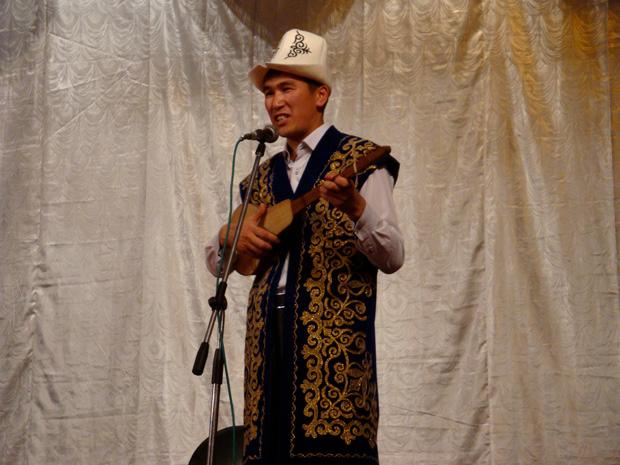Kyrgyzstan’s Akyn Poets
One of Kyrgyzstan’s most prominent akyns, Aaly Tutkuchov (Photo: Lily Jamali)
The small Central Asian republic of Kyrgyzstan held a presidential election recently. It was the first peaceful handover of power since the end of the Soviet Union.
A violent revolution last year overthrew the previous president.
As the country’s fledging democracy moves forward, the local media have been covering events closely.
But so has an older, arguably more powerful institution in Kyrgyzstan.
For centuries, the people of Kyrgyzstan have used improvisational poetry as a way of telling their nation’s story.
The poets are called “akyns” — and in a country that’s experiencing rapid political change — they are considered the voice of the Kyrgyz.
At this performance in the ethnically-torn southern city of Osh, two of the nation’s most prominent akyns, Aaly Tutkuchov and Jenishbek Jumakadyr, banter about the power they wield over politicians, some of whom are in the audience.
“They’re afraid” — sings Tutkuchov. “They’re thinking “What will they say about me?”
Jumakadyr responds: “Someone’s taking cell phone video of us. They must be with the National Security Service.”
Akyns are masters of improvisation. The two-person performance itself called an “aytish” — is like a cross between an American rap battle and a stand-up comedy routine.
In another routine, the akyns talk smack about fellow performers. Tutkuchov jokes that a guy waiting in the wings to come on is so short, he has to wear high-heels — Jumakadyr responds that even then, he can hardly reach the microphone.
The men play a small three-string guitar-like instrument called the Komuz in between insults.
But like the best rap artists, akyns take their role in Kyrgyz society very seriously.
Tutkuchov says he sees himself almost like a journalist, creating a political dialogue for the public and keeping lawmakers in check.
If one akyn is promoting the government or some leader, the second akyn should take the opposite point of view, he says. He should judge how that akyn is supporting the government.
And politicians try to curry their favor. Tutkuchov says when that fails, politicians sometimes threaten akyns after a performance. He’s had to change his phone number to stop harassing calls.
“We know — when we point out wrongdoing — they will try to put pressure on us. Or make us scared of them but we’re not afraid of them. This is the important thing about akyns. We need to tell the truth,” Tutkuchov says.
Kyrgyzstan’s akyn tradition is making a comeback after decades of Soviet rule.
Ethnomusicologist Elmira Kochumkulova says Soviet officials would force akyns to tell them what they planned to say ahead of time — even though akyns are supposed to improvise.
And sometimes, the Apparatchicks would make akyns an offer they couldn’t refuse.
They knew they could use their skills — oral art — because they were quite popular among the people. They used them to spread soviet ideology, to spread soviet culture to remote villages, mountain villages among the Kyrgyz. Oral poets were used like propaganda tools.
Two decades after the fall of the Soviet Union, the status of the Kyrgyz akyn is returning to its former glory
Kuchumkulova says the power of akyns shouldn’t be underestimated. They really are the social commentators of Kyrgyzstan. They’ve helped the country transition to democracy and deal with some of the traumatic events of the past year.
That includes the death of dozens of people in an uprising that led to former President Kurmanbek Bakiyev’s ouster.
When the April 7 events happened and over 80 young men died, they were key players at the funeral, improvising funeral songs for these men at the burial site.
“My dear Kyrgyz. You’ve seen so many things, you’ve gone through so much sorrow,” one of the akyans sang.
And they have.
After the political and ethnic violence of the last six years, last month’s presidential election was peaceful.
But it’s also seen as Kyrgyzstan gravitating back into Russia’s sphere of influence.
And the akyns will most certainly have something to say about that.
We want to hear your feedback so we can keep improving our website, theworld.org. Please fill out this quick survey and let us know your thoughts (your answers will be anonymous). Thanks for your time!
